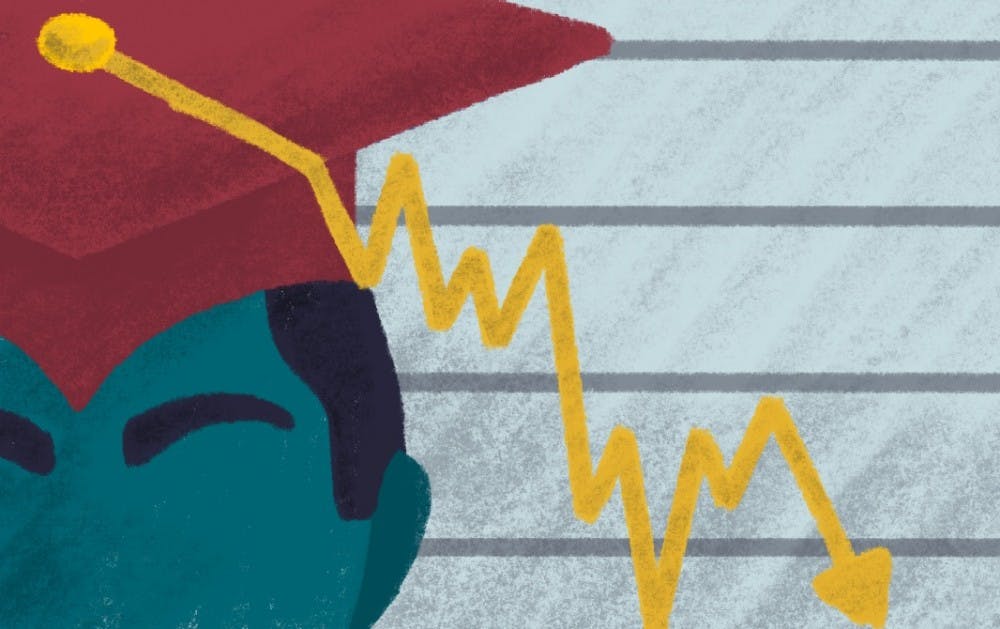Many economists are predicting a recession will occur within the next few years, and the impact on the nation can stunt post-grad plans for college students.
When the yield curve inverted earlier this year, fear was sparked throughout the nation.
This movement is viewed by economists as a reliable recession indicator. Since the 1950s, every U.S. recession since has followed this sort of inversion, according to the Washington Post.
When the Great Recession hit in 2007, the U.S. saw the greatest decline in economic activity since the Great Depression. People entering the workforce, such as college students, were among those most impacted.
Lower incomes, fewer job opportunities and a rise in the unemployment rate, are among the many side effects of a recession. With buzz of a 2020/2021 recession, students and adults alike are bracing for the impact it might have on the job market.
Daniel Marburger, a clinical professor in the Department of Economics at ASU, said one of the causes of a recession is slowed down economic activity.
He compared a recession to a “virus that spreads from one sector of the economy to the other.”
Marburger said when people aren't purchasing new cars, the demand for new cars goes down, which negatively impacts workers because fewer people are needed to produce cars. This also negatively impacts the steel industry since people are ordering less steel, along with rubber and glass industries.
An Economic Policy Survey conducted in August by the National Association for Business Economics, NABE, shares that 38% of respondents believe the U.S. will enter a recession in 2020 and 34% believe the next recession will take place in 2021. This means nearly three-fourths of economists surveyed predict a recession before the end of 2021.
Marburger stressed that recessions do not last forever, and one of the main downsides of recessions is, “it's not your fault, and yet you're the victim.”
“You're applying for jobs, you're sending out resumes, signing up for employment agencies ... The problem is most of them will not bear fruit,” he said. “And there's just a recognition that, ‘I might have to just stick with the kind of job I've gotten now until times get better.’”
Marburger said that an economic recession would make finding a job very difficult for graduating college students since businesses that are not doing well will have to reprioritize spending.
“One of the lowest priorities for them is hiring a student right out of college because they have no relevant experience,” Marburger said. “So students who graduate in a recession will have a very, very difficult time trying to find the kinds of jobs that they went to college to get … The kind of jobs that they went to school to get simply aren’t available to them.”
He said that students will “wind up having to hang on to the kinds of jobs that they had through college.”
Alexander Hill, a clinical assistant professor in the Department of Economics, graduated college with an undergraduate degree in 2008 — in the middle of the Great Recession. He said economic slowdowns are a natural part of the business cycle and don’t “necessarily mean things are going to fall apart.”
Hill explained that a shock, or a big event, will be what pushes the U.S. into a recession, and economists are concerned that a potential trade war might be the shock.
If the U.S. were to enter an economic recession within the next year or two, Hill said it would mean a few things for graduating students.
One, he said, is students might have to alter their out-of-college expectations. Hill said although students graduating from college might want a high starting salary, it might be more realistic to find a job where they can gain the most skills and build a consistent employment record.
“The key thing is to establish a job in your area rather than trying to go for the shiniest thing,” Hill said.
When Hill entered the workforce during the Great Recession, he said he accepted a low-paying job in his field to gain experience that set him up for future success.
He said that another decision he made that helped him greatly is pursuing a graduate degree post-undergrad.
“A lot of people end up going to grad school,” Hill said. “They tend to just kind of wait it out … For those who can, you (can) stay out of the job market and go get your graduate degree now instead of a few years later.”
Santiago Carbajal, a senior economics major and marketing director of the Student Economics Association at ASU, said as a potential recession looms closer, he is focused on finding any job rather than a “dream job.”
He said there is little chance the next recession will be similar to the Great Recession, but as someone who is entering the workforce soon, the thought is still unnerving.
"As it gets more attention and looms closer I think I'm pretty confident in finding a job (as soon as possible) ... as opposed to taking my time and trying to find the dream job per se," Carbajal said. "I would take any job, especially if I knew a recession is coming soon."
Reach the reporter at jlmyer10@asu.edu or follow @jessiemy94 on Twitter.
Like The State Press on Facebook and follow @statepress on Twitter.




